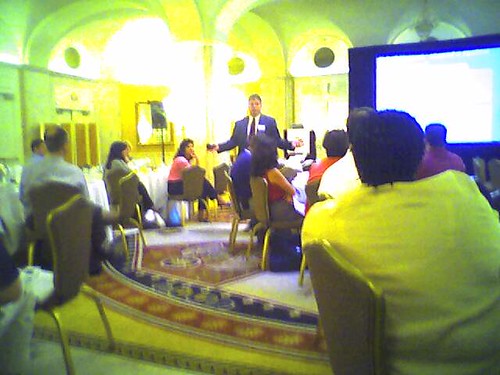Last night, Gordon Dahlby posted the following message to the WWWEDU list. This is candy for me, and I am posting my response to the weblog.
On Jul 2, 2005, at 6:28 PM, Gordon Dahlby wrote:
What would a wikipedia type textbook look like? Such as, what would we need to create a wikipedia-type 1-9th grade math textbook series or social studies, or fill-in-the blank subject?
What is it from a “textbook” that attracts teachers and schools to purchase this.
Wikitextbooks would be perpetually added to by teachers, curriculum directors, student teachers, graduate and undergraduate students, SME (subject matter experts), and, perhaps, students, and perhaps the business world.
What does the group think?1
I suspect that this is the way that we are going, though we will need something richer than most wiki engines that exist today. I would probably put students on top though, making the textbook more of a personal digital textbook, rather than a class publication. The teacher’s contribution would be more akin to today’s powerpoint presentations, though MUCH richer. The teacher would present or provide a multimedia information product and students would pick and choose, and mix and re-mix that and other content and media to enrich their own digital textbooks. It would be part eportfolio and part digital library.
Also, don’t leave out the publishers. They would produce effectively packaged content and sell it piece-meal, each student or teacher receiving an allowance for fee-based media to be include in their resources.
The bottom line is that education would be a combination of goals-based and standards-based expectations (though we would rescue the standards from the government [amateurs] and put it back in the hands of professional educators). Students would be told, “after this unit, you must be able to do these things, or you must know these things and be able to do this with them.” Students, with the ongoing consultative assistance of teachers and others, would work to achieve the goals, constructing a growing personal digital library in the process. And, of course, they would have access to their digital library while taking their tests (except for the most basic/fundamental skills).
At NECC, I started using MediaWiki for my online handouts. I found an extension, developed by two German engineers, that displays RSS feeds, so that blog articles written about the sessions would appear within the handouts. Also, for the podcasting presentation on Thursday, veteran podcasters Jeff Moore, Bud Hunt, Steve Dembo, and Eric Jefcoat contributed content about how they produce their programs.
2¢ worth!
1Dahlby, Gordon. “Curiosity on wikitextbooks.” Online posting. 2 Jul 2005. WWWEDU. 03 Jul 2005. <http://groups.yahoo.com/group/wwwedu/message/7069>.
 On Tuesday night, I had the pleasure of attending a book reading and signing at one of Raleigh’s independent book stores, Books a Quail Ridge. The author was one of my favorite sci-fi writers, Orson Scott Card. For most, his most prominent work is Ender’s Game and the following series. He has also written a parallel series referred to as the Shadow books.
On Tuesday night, I had the pleasure of attending a book reading and signing at one of Raleigh’s independent book stores, Books a Quail Ridge. The author was one of my favorite sci-fi writers, Orson Scott Card. For most, his most prominent work is Ender’s Game and the following series. He has also written a parallel series referred to as the Shadow books.
 I suppose this is the best moment for
I suppose this is the best moment for  It’s morning, and I’ve finally gotten around to reading yesterday’s USA Today (compliments of Holiday Inn Express). I’m intrigued by the story of a human built space craft crashing into a comet.
It’s morning, and I’ve finally gotten around to reading yesterday’s USA Today (compliments of Holiday Inn Express). I’m intrigued by the story of a human built space craft crashing into a comet. Last night will go down as a high point in 2005 NECC. First of all, I went to the
Last night will go down as a high point in 2005 NECC. First of all, I went to the  I was lucky enough to be invited to the Intel Breakfast this morning and got to finally listen to Mike Hall, of the Georgia State Department of Education. It seems like Georgia is doing some interesting and bold things, which doesn’t surprise me with Hall at the helm.
I was lucky enough to be invited to the Intel Breakfast this morning and got to finally listen to Mike Hall, of the Georgia State Department of Education. It seems like Georgia is doing some interesting and bold things, which doesn’t surprise me with Hall at the helm.